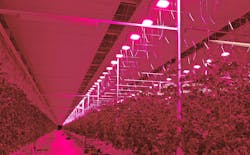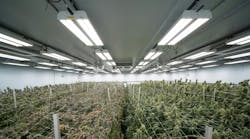The horticultural lighting division of Britain’s Plessey Semiconductors has spun out from its parent and is now a separate, venture-backed entity called Hyperion Grow Lights, working in partnership with Plessey as well as with lighting industry number-two Osram, LEDs Magazine has learned.
Former Plessey director of grow lights Jonathan Barton heads up the new company which he co-founded along with Maarten Klein, who was head agronomist at Plymouth, England-based Plessey and who now holds the same title at Hyperion.
The split appears to have happened late last year or early this year. Neither Plessey nor Hyperion has announced it. Barton’s LinkedIn page states that he started as managing director of Hyperion in January 2020. The page identifies the company as “Hyperion Grow Lights, formerly the grow lighting division of Plessey semiconductors.”
London-based technology investment firm Endeavour Ventures is backing the spin-out, according to Hyperion’s website, which also notes that Hyperion is working with Plessey engineering and with Osram “for development of Hyperion LED light engines.” The company did not reveal the size of Endeavour’s or any other investors’ funding.
Hyperion has announced at least two developments since breaking from Plessey. In January it introduced a 1000W LED toplight called the 3k, rating it at up to 3000 µmol/s and with to 3.5 µmol/J efficiency, using Plessey engineering and Osram LEDs. Hyperion provides complete lighting systems, and works closely with British agricultural research center Rothamsted Research, a non-profit group funded by the UK government.
Also in January, Plessey said German grower Gemüsebau Steiner had installed Hyperion LED toplights at a 5000m2 tomato greenhouse. Gemüsebau Steiner promotes its growing techniques as carbon neutral, using techniques including biogas, geothermal heat, and solar electricity to help operate a sprawling 196,000m2 (19.6 hectares) facility in Kirchweidach, Upper Bavaria.
The German project would appear to have been initiated during Plessey’s stewardship, prior to the spinout. Plessey branded its horticultural lights as Hyperion, a brand that the new company is now using not only on its products but also for its corporate name.
Under Plessey ownership, the horticultural lighting group proved that LED-lit greenhouses do not have to suffer from the absence of heat that traditional high-pressure sodium (HPS) grow lights emit, as long as the greenhouses are engineered in a certain way as they were at the 5.4-hectare Tomato Masters farm in Belgium.
Plessey Semiconductors is a privately-held company known for LED chip designs and for micro LED displays. One of its main focuses these days is on micro LEDs for use in augmented reality applications.
It had been in the horticultural luminaire business since 2016, through a licensing agreement with another British company, PhytoLux.
MARK HALPER is a contributing editor for LEDs Magazine, and an energy, technology, and business journalist ([email protected]m).
For up-to-the-minute LED and SSL updates, why not follow us on Twitter? You’ll find curated content and commentary, as well as information on industry events, webcasts, and surveys on our LinkedIn Company Page and our Facebook page.






